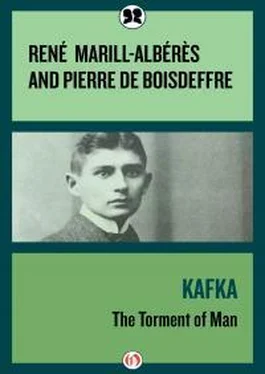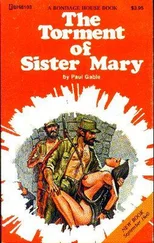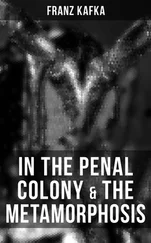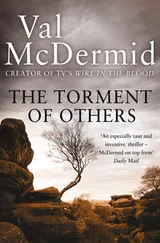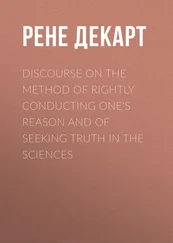That he was a highly cultured person is not surprising, for between the ages of sixteen and twenty-five he discovered the works that were to appeal to him throughout his lifetime. His education consisted of superimposing on the Talmudical training befitting a young Jew an intensive German initiation into the classics, supplemented by the essential works of the Western heritage. Not cursory headings but complete intimacy with writers whom he loved. According to Max Brod,
… The love he felt for Goethe and Flaubert never changed in all the two-and-twenty years I was a close friend of his. In the case of some writers, such as Hebbel and Grillparzer, Kafka liked their diaries better than their works—or so it seemed to me, at least. I have never heard him pass disrespectful remarks against the great, never heard him use the method of bluff which is so popular nowadays, and which consists in an impertinent and effectively delivered sneering reference to a writer’s “youthful period” and his “puerilia.” 21
In French literature, for example, he liked particularly Pascal (quoted in his Diaries ), Balzac, and Flaubert, whom he read in the original. Among contemporary writers, he liked Francis Jammes and Claudel (whom he met when the poet was consul in Prague).
He deciphered the Greek text of Protagoras , but he returned again and again to the Bible, the great fountain of sacred art, and to Goethe, the patron saint of profane art. Among the great writers of Germany, he assigned an important place to Thomas Mann, Hermann Hesse, Hans Carossa, and also to Kassner, Emil Strauss, and Wilhelm Schafer. Just as he had been one of the first admirers of Thomas Mann’s Tonio Kröger , he was able to assign Hofmannsthal to his rightful place. But their influence is scarcely discernible in his work, which owes much more to the Bible (whose overtones infuse it and constitute an invisible substructure); to the approach and presence of war; to his observations in the office or factory; and, natu rally, to meditation of Kierkegaard, whose work often parallels his own.
Kafka’s modesty, unlike Proust’s, was a subterfuge, a mask that enabled him to observe his contemporaries. Quite natural in his case, it co-existed paradoxically with the ironic look which he fixed on living beings and things. If he discovered something ridiculous in great men whom he respected, it was with “a quiet tear of regret.” 22
The slightest difficulties encountered in life were for him mountains. He proposed to substitute for the motto engraved on Balzac’s cane (“I break every obstacle”) a motto of his own: “Every obstacle breaks me.”
Only lengthy entreaties could persuade Kafka to permit his friends to glance at his manuscripts. This attitude was due not to pride but to exaggerated self-criticism—according to Max Brod, who was his friend long before learning of his writing—even though this fact seems strange to anyone who knows how fervently young people long to have others admire their scribblings. He nevertheless offered to read a few fragments from his first work to his friend Oskar Pollac (a young historian of art who was killed in the flower of manhood) but was quick to warn him about the lack of discipline which, according to Kafka, explained the inadequacy of these “childish sketches”: “Art needs hard work more than hard work needs art.”
Only the entreaties of his friends could persuade him to publish. He had used a pseudonym to participate in a literary contest sponsored by the Vienna Zeit in 1906. Three years later he read to Max Brod the first part of a long story, “Preparations for a Wedding in the Country,” in which Raban, the hero—who is like a brother to Kafka—leaves his workshop to go and see his fiancée. The long description of the station, the train, the travelers, and Raban’s reflections are reminiscent of Proust’s first writings, notably Jean Santeuil . This text was enough to convince Max Brod that “here was no ordinary talent speaking, but genius” and to cause him to add Kafka’s name to a list of prominent authors (Blei, Mann, and Wedekind) as early as 1907, before his friend had published anything. It was in Franz Blei’s journal that Kafka’s first works were published; soon others appeared in the Prague daily, Bohemia —notably—but without eliciting any reaction—his first “Meditations” ( Betrachtungen ).
Literary creativity, following the normal course of events, should have rid Kafka of his complexes. For when experienced with such intensity, it acts as a catharsis: the writer uses imaginary beings to rid himself of temptations and obsessions which he alone could not exorcise. And surely art could have provided a solution to Kafka’s problem. At any rate, Kafka never imagined another solution. He says again and again, “I am nothing except literature … I cannot and will not be anything else … Everything except literature bores me and I detest it.” But he never looked upon literature as a career: it was a religion . Writing could not be an occupation like other occupations; it was “a form of prayer.” Kafka found it normal to sacrifice to art his pleasures, his serenity, his health, even his life; and this is exactly what he did, once he became convinced that “by staying alive I should interrupt my writing less … than by dying.” 23
Thus, when he had to choose a career after he had studied law for one year (the day after he took his doctorate in jurisprudence at the University of Prague, on June 18, 1906)—for the father could not allow his son to waste time “scribbling”—Kafka decided that “his job should have nothing to do with literature. That he would have regarded as a debasing of literary creation.” In spite of what Max Brod thinks, Kafka was probably fortunate in having steered clear of journalism, for it exhausts the writer without enriching him. In July of 1908 he managed to obtain a semigovernmental and highly coveted post with a “single shift,” which enabled him to keep his afternoons free for literary creation. 24
But he was unable to profit from these few hours which many others would have cherished. After leaving the office, he still suffered from the obsession of the sterile work to which the morning had been devoted. Sleeping in the afternoon and writing at night, though he tried to follow this plan for some time, was not a solution compatible with his frayed nerves. Consequently he finally came to look with horror on his post. “My job is unbearable because it goes counter to my sole desire and my sole vocation which is literature,” he wrote to his fiancée’s father. “Since I am nothing except literature, since I cannot and will not be anything else, my job can never excite me, but it can easily distract me completely. I have almost reached that point …”
His experience with bureaucracy was certain to instill in him the elements of absurd symbolism illustrated in The Trial and The Castle . According to Max Brod, “it was the uneasiness associated with his work and not the father complex that initiated the process which was to bring him closer and closer to the heart of suffering, before bringing him to sickness and to death.” Kafka’s superiors, sympathetic and tolerant, remembered him as a punctual, meticulous, and singular employee; but he himself could not keep from thinking that “any employer is unhappy with his employees, the difference between employers and employees being too great to be offset by simple obedience on the part of the latter!” This compensation could only be accomplished “through their mutual hatred.”
Inside this Purgatory which he made into a Hell, Kafka enjoyed some moments of remission, beginning with the annual vacation—two or three weeks only—which made it possible for him to travel in Europe with friends, most often with Max Brod. He would then depart from Prague for Germany, Italy, the Adriatic coast (the beach at Riva), Switzerland (August, 1911), the Italian lakes, or even for Paris (October, 1910).
Читать дальше
